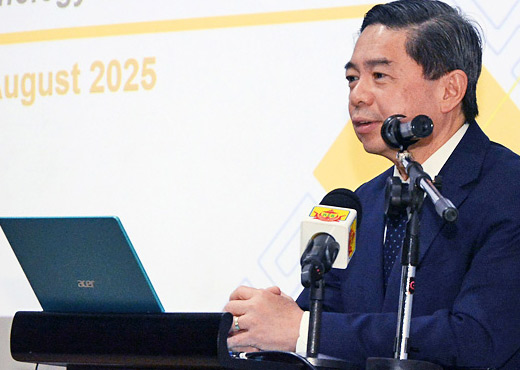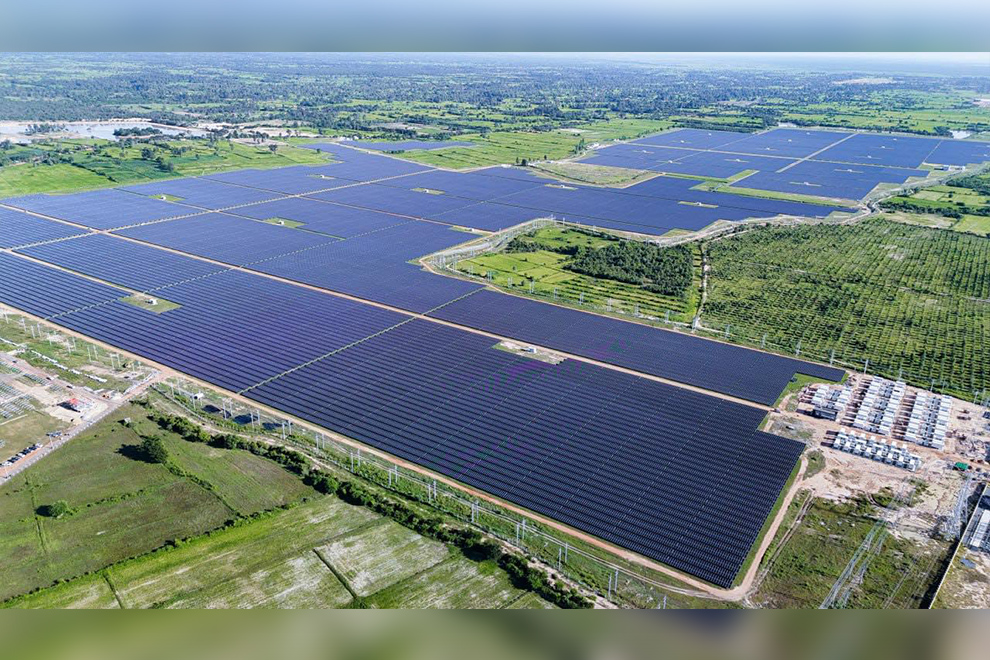Minister at the Prime Minister’s Office and Minister of Finance and Economy II Dato Seri Setia Dr Awang Haji Mohd Amin Liew bin Abdullah yesterday shared insights on Brunei Darussalam’s current economic status and the direction towards national economic progress to achieve Goal 3 of Brunei Vision 2035: ‘A Dynamic and Sustainable Economy’.
In his presentation ‘Economic Blueprint for Brunei Darussalam – Economic Growth and Diversification Through Technology and Innovation’, he highlighted the role of technology and innovation in the efforts to develop and diversify the national economy, as well as ongoing initiatives and future plans aimed at advancing economic development.
The development status of micro, small and medium enterprises (MSMEs) was also discussed. He also outlined six guiding principles and policies for the Economic Blueprint: productive and vibrant businesses; skilled, adaptive and innovative people; an open and globally-connected economy; a sustainable environment; high-quality and competitive economic infrastructure; and good governance and public service excellence.
On Brunei Vision 2035, the minister said, “Although there are 10 more years to go, the next five years will be very important for Brunei. If we can perform well, we will start to see the benefits in the following five years.”
He also revealed several foreign direct investments such as a marine yard expected to be operational early next year and an investment from India expected to take off in 2027, as well as Hengyi’s Phase Two. He added that several investors from China have also shown strong interest to invest in Brunei.
Source: Borneo Bulletin
Read the full article here
Developed by Seri Suria Power (B) Sdn Bhd—a joint venture of Serikandi Oilfield Services, Khazanah Satu (a government-linked company), and Malaysia’s Solarvest Holdings subsidiary Atlantic Blue—the solar plant is sited on a remediated 32.29-hectare landfill. Scheduled for operation by the end of 2026, it will produce over 64,000 megawatt-hours annually, powering more than 15,500 homes and offsetting an estimated 41,000 tonnes of CO₂ each year.
“This is more than a construction project. It is a symbol of Brunei Darussalam’s commitment to sustainable development and energy diversification,” said Seri Suria Power director Dato Paduka Awang Haji Jamain bin Haji Julaihi. “We are laying the foundation for a cleaner, more resilient Brunei, committed to sustainable energy for generations to come.”
Source: Borneo Bulletin
Read the full article here
More citizens enter the workforce
Brunei Darussalam’s unemployment rate fell to 4.7 per cent in 2024, down from 5.1 per cent the previous year, as more locals secured jobs in both the public and private sectors, according to the latest Labour Force Survey (LFS) released by the Department of Economic Planning and Statistics (DEPS).
The decline in unemployment comes as the country’s employed population rose by 2.9 per cent, reaching 222,300 people — a notable increase from 216,000 in 2023. The boost was largely driven by strong job growth in the private sector, which recorded a 4.0 per cent increase, compared to 0.3 per cent in the public sector.
Among sectors, the wholesale and retail trade industry led with an 18.3 per cent jump in employment, followed by construction (15.8 per cent) and accommodation and food services (13.5 per cent) — signalling rising demand and business activity in domestic services and infrastructure.
Local workforce highlights
Of the total labour force of 233,200 persons aged 18 and over, 95.3 per cent were employed, while 10,900 people remained unemployed. The majority of those unemployed had secondary education or below (54.1 per cent), and those aged 25 to 64 years made up nearly 60 per cent of the unemployed population.
Meanwhile, more than half of local workers (58 per cent) were employed in the private sector, showing a steady shift away from public sector reliance. By field of employment, locals were mainly employed in public administration (26.0 per cent), wholesale and retail trade (12.6 per cent), and education (12.1 per cent).
In terms of occupation, the largest group were service and sales workers (25.6 per cent), followed by professionals (22.5 per cent) and technicians and associate professionals (15.4 per cent).
Source: Borneo Bulletin
Read the full article here
Photo source: Canva
Published: July 25, 2025
A 10-megawatt solar power plant, combined with an energy storage battery system developed by SchneiTec ZEALOUS, has officially begun operations in Pursat province.
The inauguration ceremony took place at the project site in Sna Ansa commune, in Krakor district. The event was attended by Keo Rottanak, Minister of Mines and Energy, Uneno Atsushi, Japanese Ambassador to Cambodia, Khoy Rida, governor of Pursat Province, and many other stakeholders.
In his opening remarks, the Pursat governor drew attention to how political stability and the close attention of the authorities at all levels have made Pursat an attractive location for investment in many sectors. At present, Pursat is a key area for solar and hydroelectric investment.
“Today, Pursat province is seeing remarkable growth, transforming from a transit province into one full of industrial and tourism investment appeal,” he said.
Energy minister Rottanak noted how the seventh-mandate government is working to strengthen economic partnerships with the private sector through the implementation of several new policies aimed at attracting foreign direct investment. He emphasised how the solar project inaugurated today is vital in supporting the province’s economic development.
He added that it will help supply Cambodia’s national grid and promote the development of renewable energy in the country, ensuring a stable energy supply through low-carbon sources, paving the way towards carbon neutrality.
“This project was invested in by Chugoku Electric Power Company, one of Japan’s leading electric power companies, in cooperation with SchneiTec Zealous, which is already established in Cambodia,” he continued.
Japanese Ambassador Ueno Atsushi stated “This solar power and battery storage project will help meet Cambodia’s growing electricity demands and contribute to greenhouse gas reduction efforts,” added Japanese ambassador Ueno.
For full article, please read here
Source: The Phnom Penh Post
























